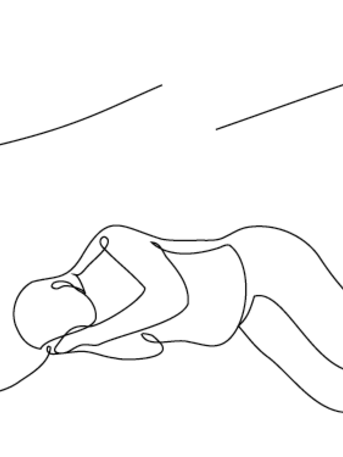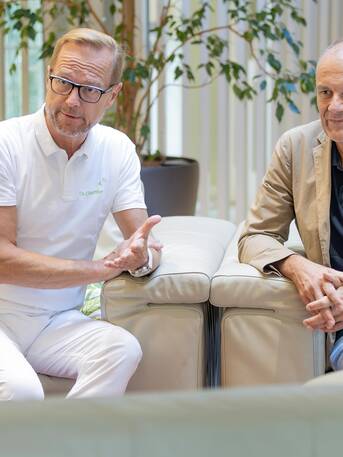Diagnostics
Park Igls offers a new programme for people who suffer from exhaustion.
"I feel drained, exhausted, tired. Unfortunately, we have heard this very often over the past year from some of our guests," says Dr Peter Gartner, Medical Director at Park Igls Medical Spa Resort. "If patients don’t improve even though they get sufficient sleep and rest, they need to see a doctor," says the experienced physician. Constant tiredness, an increased need for rest and a lack of energy can be hallmarks of fatigue syndrome. This condition is defined as persistent debilitating physical and mental exhaustion. If fatigue symptoms do not subside over a period of four to six months or if they recur, they are referred to as ME / CFS – myalgic encephalomyelitis or chronic fatigue syndrome.
The root cause of fatigue has not been identified yet. There is increasing evidence that the condition might be caused by dysregulation of the immune system and the autonomic nervous system, primarily due to viral or bacterial infections.
Common symptoms include difficulty falling and staying asleep, brain fog (i.e. difficulty concentrating and focussing), unstable blood circulation, reduced performance capacity, susceptibility to infections, gastrointestinal complaints, chronic or acute pain in muscle tissue, bones and joints, and increased sensitivity to pain and external stimuli. The main hallmark of ME / CFS is post-exertional malaise (PEM), which is a stress-induced, disproportionate deterioration in condition due to an impaired physiological post-activity recovery response. In simple terms, this means that people affected by ME / CFS are barely or not at all able to tolerate exertion; even minor physical, cognitive, mental, orthostatic (drop in blood pressure when standing up or standing upright) or sensory stress can lead to a deterioration in health and/or the emergence of new symptoms. The deterioration can last for hours, days or even weeks.
"Despite the very high number of people affected, there is by and large no suitable healthcare system to turn to in the entire German-speaking region," says Dr Gartner.
Complex and difficult diagnosis
As there is no clear fatigue marker, i.e. no biometric or physiological indicator that could be used to measure and assess tiredness and fatigue, the diagnosis of fatigue is extremely complex. The diagnostic approach at Park Igls is therefore multidimensional. "By taking a detailed medical history and analysing bloods, physiotherapeutic findings, nutritional history and current medication, we get a full picture of a patient's state of health and are able to rule out other conditions such as hypothyroidism, diabetes or anaemia. A key component of our diagnostic approach is a special chemical laboratory urine analysis, which provides information about tryptophan metabolism, including energy-relevant neurotransmitters and other metabolic substances responsible for fatigue," explains Dr Gartner. ME / CFS is diagnosed at Park Igls based on the internationally established Canadian Consensus Criteria.
Therapeutic approach
There is currently no curative treatment for fatigue syndrome. This is why treatment at Park Igls Medical Spa Resort is based on an interdisciplinary and symptom-orientated approach. Together with experts from various medical and therapeutic fields, who work together to alleviate symptoms and improve the well-being of those affected, Park Igls aims to provide the best possible care. At present, only individual symptoms can be treated with medication.
In addition to intestinal cleansing and regeneration, overall rest and an alkaline-based Modern Mayr Medicine diet, the new Fit not Fatigue programme puts a particular focus on the mitochondria. With specialised cell training (IHHT), our mitochondria allow tissue to be rejuvenated and performance to be increased. Detoxifying liver wraps, invigorating infusions and vitalising massages complete the range of therapies on offer. What length of stay is recommended for Fit not Fatigue? "This question is actually irrelevant for those affected," says Dr Gartner. "The relevant question is: 'Where can I go to get professional help for my symptoms and challenges?' But what I can say for sure is that the length of stay for diagnosis and treatment tends to be longer for issues such as fatigue, but this should always be assessed on an individual basis taking into account existing symptoms. Ideally, you should stay for three, or even better four weeks to really achieve lasting effects."
New programme
Fit not Fatigue
Do you feel exhausted? Are you low on energy and need more rest than usual, and even sufficient sleep doesn’t help? This could be a sign of fatigue syndrome. Our programme offers comprehensive diagnostics including metabolic substance and physiotherapeutic analysis. It focuses primarily on our mitochondria. With specialised cell training (IHHT), our mitochondria allow tissue to be rejuvenated and performance to be increased. Detoxifying liver wraps, invigorating infusions and vitalising massages complete the range of therapies on offer.
Get in contact
Got questions about fatigue, symptoms or programmes at Park Igls? Our medical department will answer them discreetly and personally. Phone: +43 (0)512 377 305







